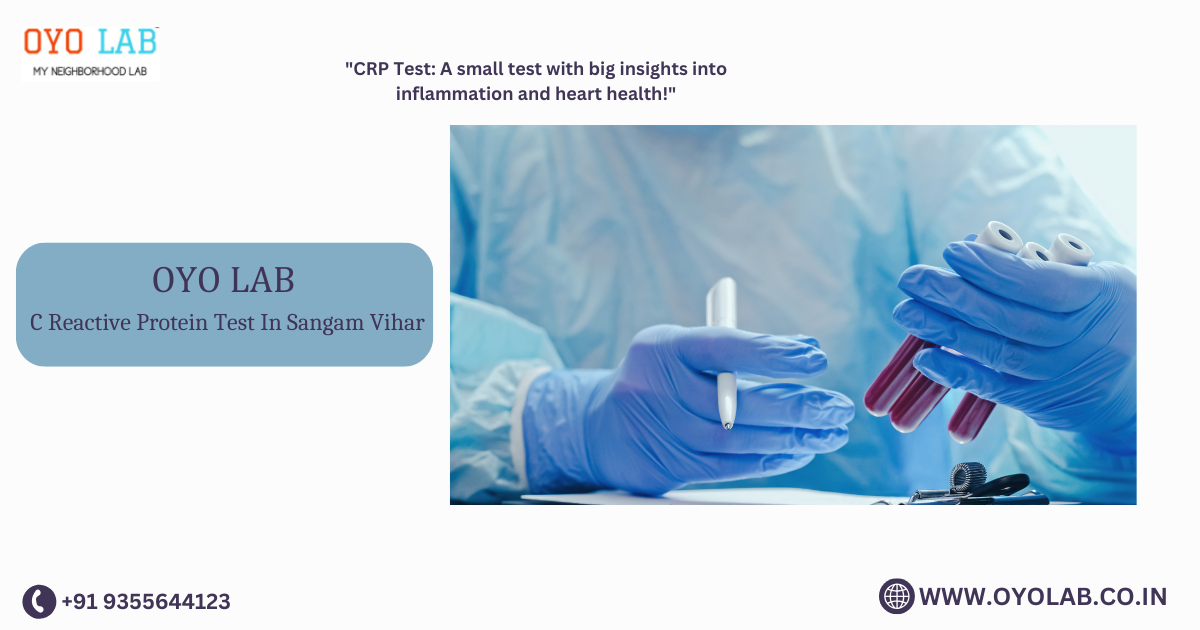
C Reactive Protein Test In Sangam Vihar
By Shilpa | March 15, 2025
What Is C Reactive Protein Test ?
A C-Reactive Protein (CRP) Test measures the level of C-reactive protein in the blood. CRP is a protein produced by the liver in response to inflammation. High CRP levels indicate infection, chronic diseases, or inflammatory conditions such as arthritis, heart disease, or autoimmune disorders.
Why Is a CRP Test Done?
Doctors recommend a CRP test to:
Detect inflammation or infections in the body.
Diagnose and monitor chronic diseases like rheumatoid arthritis or lupus.
Assess heart disease risk, as high CRP levels are linked to cardiovascular problems.
Monitor recovery from infections, surgeries, or inflammatory conditions.
Who Should Get a CRP Test?
People with symptoms of infection or chronic inflammation (fever, pain, swelling).
Those at risk for heart disease, stroke, or autoimmune disorders.
Patients recovering from surgery or infection to check inflammation levels.
Importance Of C Reactive Protein Test
A C-Reactive Protein (CRP) Test is crucial for detecting inflammation, infections, and chronic diseases in the body. Since CRP levels rise when there is inflammation, this test helps doctors diagnose and monitor various health conditions.
1. Detects Infections and Inflammation
Helps identify bacterial or viral infections before they become severe.
Detects hidden inflammation in the body, even if symptoms aren’t obvious.
2. Assesses Risk of Heart Disease
High CRP levels are linked to heart disease, stroke, and atherosclerosis (narrowed arteries).
Helps doctors evaluate cardiovascular risk and take preventive measures.
3. Helps Diagnose Autoimmune Disorders
Monitors conditions like rheumatoid arthritis (RA), lupus, and inflammatory bowel disease (IBD).
Helps track disease progression and treatment effectiveness.
4. Monitors Recovery After Surgery or Infection
Ensures healing is on track after surgery, injury, or serious infections.
Detects post-surgical complications like infections or excessive inflammation.
5. Aids in Diagnosing Chronic Conditions
Important for conditions like diabetes, kidney disease, and obesity, where inflammation plays a role.
Helps in early intervention to prevent long-term complications.
6. Helps Guide Treatment Decisions
If CRP levels remain high, doctors can adjust medications or lifestyle changes.
Useful for monitoring the effectiveness of anti-inflammatory treatments.
Benefits Of C Reactive Protein Test
A C-Reactive Protein (CRP) Test is a simple yet powerful tool for detecting inflammation, infections, and chronic diseases. Since CRP levels increase when the body is fighting an illness, this test helps doctors diagnose and monitor various health conditions.
Key Benefits of a CRP Test
1. Early Detection of Infections and Inflammation
Helps identify bacterial and viral infections before symptoms worsen.
Detects hidden inflammation that may not show up in other tests.
2. Assesses Risk of Heart Disease and Stroke
High CRP levels are linked to heart disease and stroke.
Helps doctors take preventive measures before complications occur.
3. Monitors Autoimmune Disorders
Tracks inflammation levels in conditions like rheumatoid arthritis (RA), lupus, and inflammatory bowel disease (IBD).
Helps adjust treatment plans for better disease management.
4. Helps Diagnose and Monitor Chronic Conditions
Useful for conditions like diabetes, obesity, kidney disease, and cancer, where inflammation plays a role.
Allows for early intervention to prevent serious complications.
5. Aids in Post-Surgery and Recovery Monitoring
Ensures proper healing after surgery, injuries, or infections.
Detects post-surgical infections or complications early.
6. Guides Treatment Decisions
Helps doctors determine if anti-inflammatory treatments or medications are effective.
Allows for personalized treatment plans based on inflammation levels.
7. Quick and Simple Test
A non-invasive blood test that provides fast and reliable results.
Helps doctors act quickly in case of serious health risks.